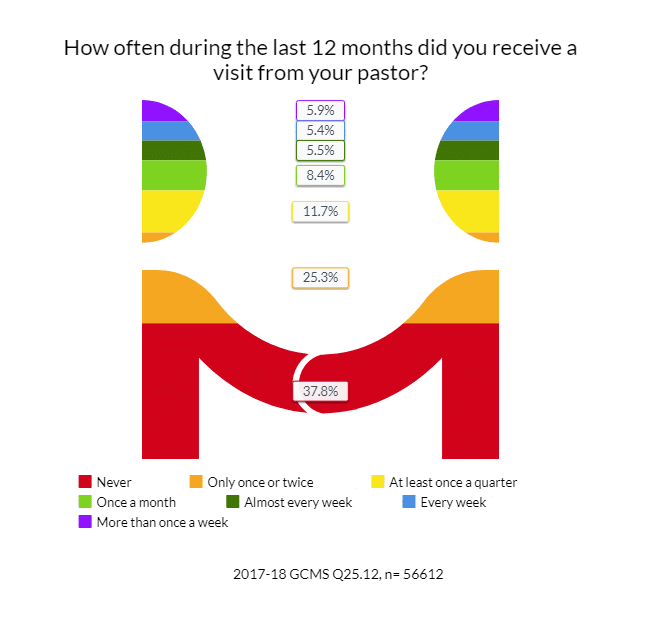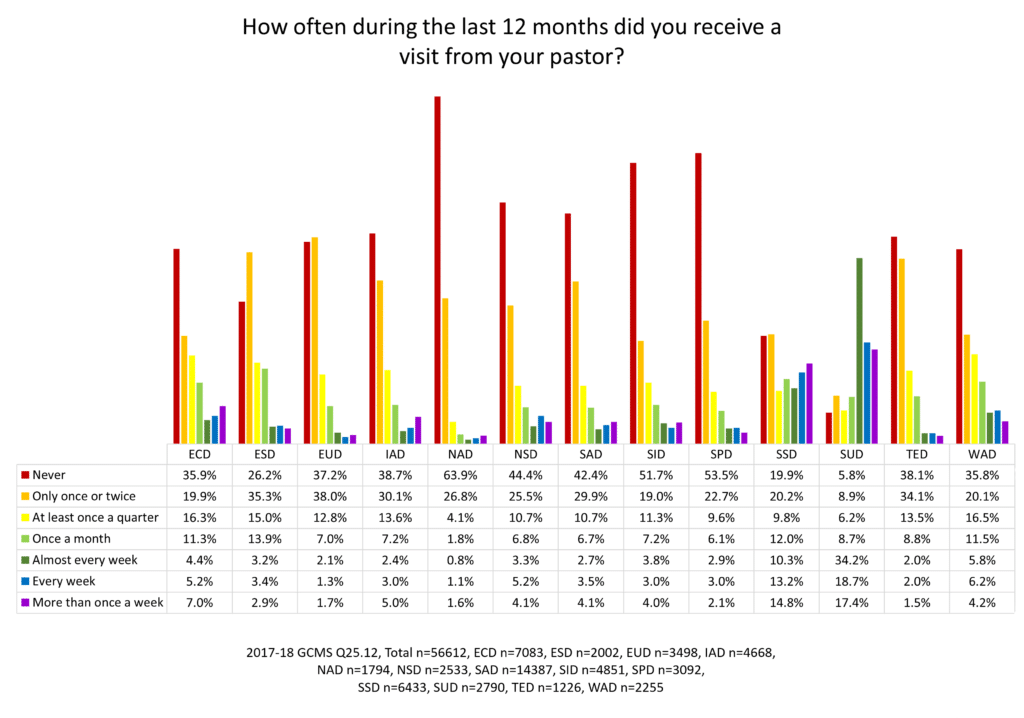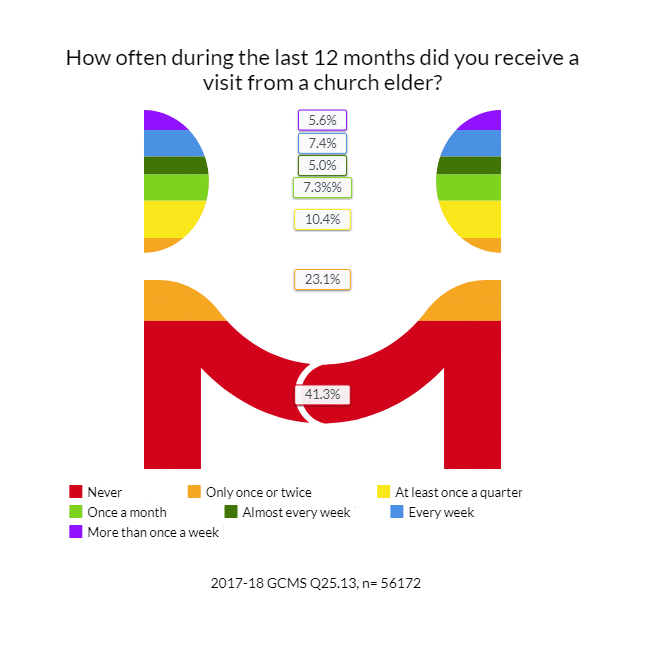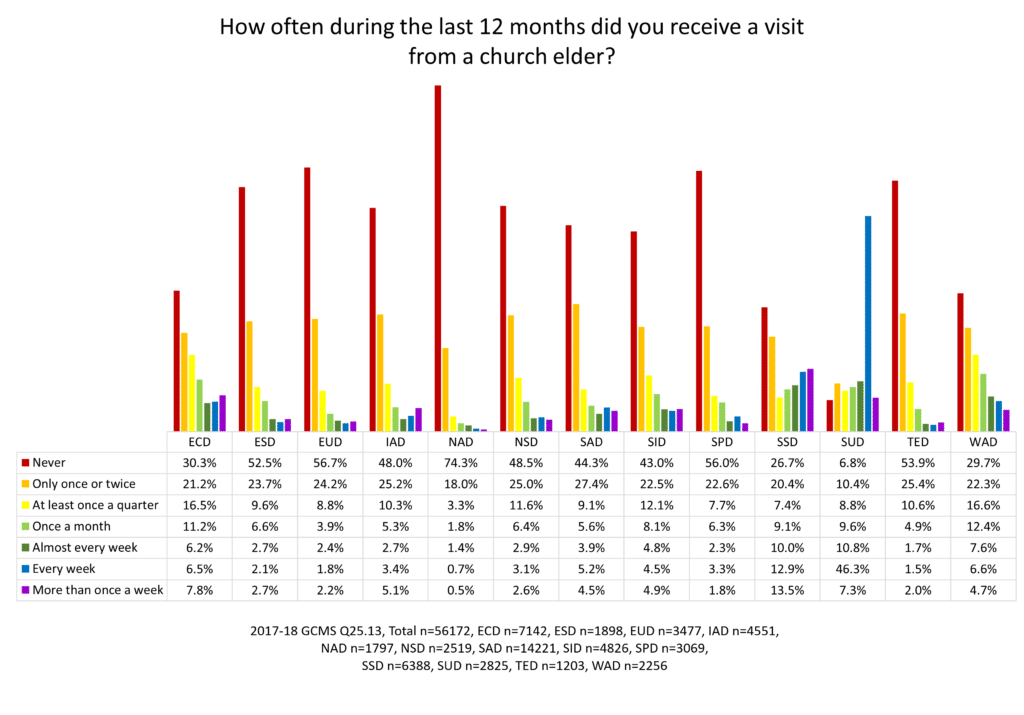Is anyone among you sick? Let him call for the elders of the church, and let them pray over him, anointing him with oil in the name of the Lord. – James 5:14 (ESV)
Church member visitation is an important task for pastors, elders, and other lay leaders. While the circumstances for visitation may differ, these leaders should be ready to minister to those with whom they visit, often by praying and sharing Scripture.
Pastoral Visits
The 2017–2018 Global Church Member Survey (2017–18 GCMS) assessed church members’ experiences as part of the church body. One area researched was how often members had been visited by their pastor in the last year. Globally, less than one in five (17%) respondents reported that in the last 12 months, their pastor had visited them almost every week or more often. Another 20% shared that their pastor had visited them once a month or once a quarter. However, a quarter (25%) reported that in the last year, their pastor had only visited them once or twice, and over a third (38%) of respondents had not been visited by their pastor at all.

When this data was cross-tabulated and examined by Division, respondents in the Southern Asia Division (SUD) reported much higher than average rates of pastoral visits; 70% of the respondents reported they had received a visit from their pastor almost every week or more often, with 17% receiving more than one visit a week! While many of the factors that influence pastoral visits are likely linked to cultural norms, it is evident that the pastors in this division have a strong commitment to spending time with their members outside of church programming.

Interestingly, respondents from the North American Division (NAD) reported the highest level (64%) of never receiving any pastoral visits in the last year, followed by the South Pacific Division (SPD) (54%) and the Southern Africa-Indian Ocean Division (SID) (52%). While again, much of this is likely attributed to culture, one must ask if such a distance between congregants and their pastor (i.e., infrequently spending time together outside of church) is healthy. It could also be that a pastor oversees several churches and, thus, is unable to provide the same member care as pastors responsible for just one congregation. Then again, are the church elders involved in member visitation?
Visits from an Elder
Respondents of the GCMS 2017–18 were also asked how often they had been visited by an elder in the last year. Nearly one in five (18%) respondents reported that in the last 12 months, an elder had visited them almost every week or more often. Another group of respondents (18%) shared that an elder had visited them once a month or once a quarter. Just under a quarter (23%) of the respondents shared that an elder had visited them once or twice in the last year, and 41% had never received such a visit.

The same pattern appeared again when this data was cross-tabulated and examined by Division. The respondents in the SUD reported much higher than average rates of visits from elders; nearly two-thirds (64%) of survey respondents shared that in the last year, they had received a visit from an elder almost every week or more often. Respondents from the Southern Asia-Pacific Division (SSD) also reported a notably high frequency of elder visits, with 36% of respondents having received a visit almost every week or more often in the last year.
Respondents from the NAD reported the highest level (74%) of never having received any elder visits in the last year, followed by the Inter-European Division (EUD) (57%) and the SPD (56%).

While it is important to consider cultural factors when reviewing this data, as well as each pastor’s capacity to visit members based on the number of congregations and church sizes, the importance of pastoral and elder visits should not be ignored. Members may be able to open up more freely in the safety of their own homes. Topics that may not seem appropriate during church service on Sabbath could be addressed in a home environment. Caring and respectful interactions can have a big impact on members, as well as on their family members (who, in many cases, may not be Christians). Member visitation is important and can have eternal implications.
“When a minister has presented the gospel message from the pulpit, his work is only begun. There is personal work for him to do. He should visit the people in their homes, talking and praying with them in earnestness and humility. There are families who will never be reached by the truths of God’s word unless the stewards of His grace enter their homes and point them to the higher way. But the hearts of those who do this work must throb in unison with the heart of Christ.” [1]
Created in collaboration with the Institute of Church Ministry.
Published by ASTR on 03-15-2023
[1] Ellen G. White, Gospel Workers, 187.1 https://m.egwwritings.org/en/book/35.953#954

